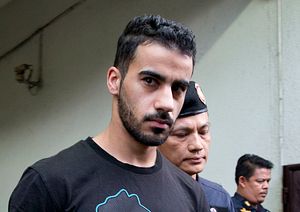Australian Prime Minister Scott Morrison has urged Thailand to stop the extradition to Bahrain of a detained football player who has refugee status in Australia, his office said Tuesday.
In a letter to Thai Prime Minister Prayut Chan-o-cha, Morrison emphasized that Hakeem al-Araibi’s case was an important matter to him personally, as well as to the Australian government and Australian people, his office said. The letter was reported earlier by The Sydney Morning Herald newspaper.
Al-Araibi, 25, a former Bahraini national team player, says he fled his home country due to political repression. Bahrain wants him returned to serve a 10-year prison sentence he received in absentia in 2014 for vandalizing a police station, a charge he denies.
Human rights groups, football governing bodies, and activists have pushed for Thailand to release al-Araibi, who plays for the semi-professional football club Pascoe Vale FC in Melbourne. They believe he risks being tortured if he is sent back to Bahrain.
Morrison noted that al-Araibi has a permanent protection visa issued by Australia, that the government only issues such visas after a careful process, and that Australia considers him a refugee.
Al-Araibi was detained upon his arrival in Bangkok in November while on a holiday, and a court ruled in December he could be held for 60 days pending the completion of an extradition request by Bahrain.
Thai Foreign Ministry spokesperson Busadee Santipitaks said the official extradition request was forwarded to Thai prosecutors on Monday for deliberation after being received from Bahrain.
Thailand’s attorney general is expected to decide within a week whether to proceed with the extradition case, said Chatchom Akapin, director general of the international affairs department. Chatchom said Thailand would not extradite al-Araibi “if the sought extradition is political.”
“If it is, then the request must be denied,” he said.
Prime Minister Prayut said the situation was complicated.
“Thai officials have to follow the law in every aspect. However, Thailand has good relations with Bahrain and FIFA,” he said, referring to football’s world governing body. “How can we find a solution? I understand everyone’s concerns.”
Human Rights Watch’s Asia director, Brad Adams, said Thailand would make a “huge mistake” if it extradites al-Araibi because “global opinion and international law are clearly opposed to this rights-violating move.”
The Asian Football Confederation on Tuesday followed FIFA and the International Olympic Committee in asking for al-Araibi’s release.
The AFC, led by Sheikh Salman Bin Ibrahim Al-Khalifa, a member of Bahrain’s royal family, had faced criticism for not calling for al-Araibi’s freedom.
Al-Araibi has said he suspects he is being sought by Bahrain in part because of critical comments he made about the AFC leader.
Al-Araibi said he was blindfolded and had his legs beaten while he was held in Bahrain in 2012. He said he believed he was targeted for arrest because of his Shiite faith and because his brother was politically active. Bahrain has a Shiite majority but is ruled by a Sunni monarchy, and has a reputation for harsh repression since its failed “Arab Spring” uprising in 2011.
Bahrain’s interior minister issued a statement Tuesday asserting that the country has a legitimate claim in asking for al-Araibi’s extradition and accusing critics of its justice system of interfering in the country’s internal affairs.
“Those raising unfounded doubts about the integrity and independence of the kingdom’s judicial system are not only interfering, but also attempting to influence the course of justice,” the statement said.
It said al-Araibi was convicted of participating in a “terrorism” case involving “an arson attack, possession of inflammable bombs and causing damage to public and private property.”
By Kaweewit Kaewjinda and Tassanee Vejpongsa for the Associated Press.

































